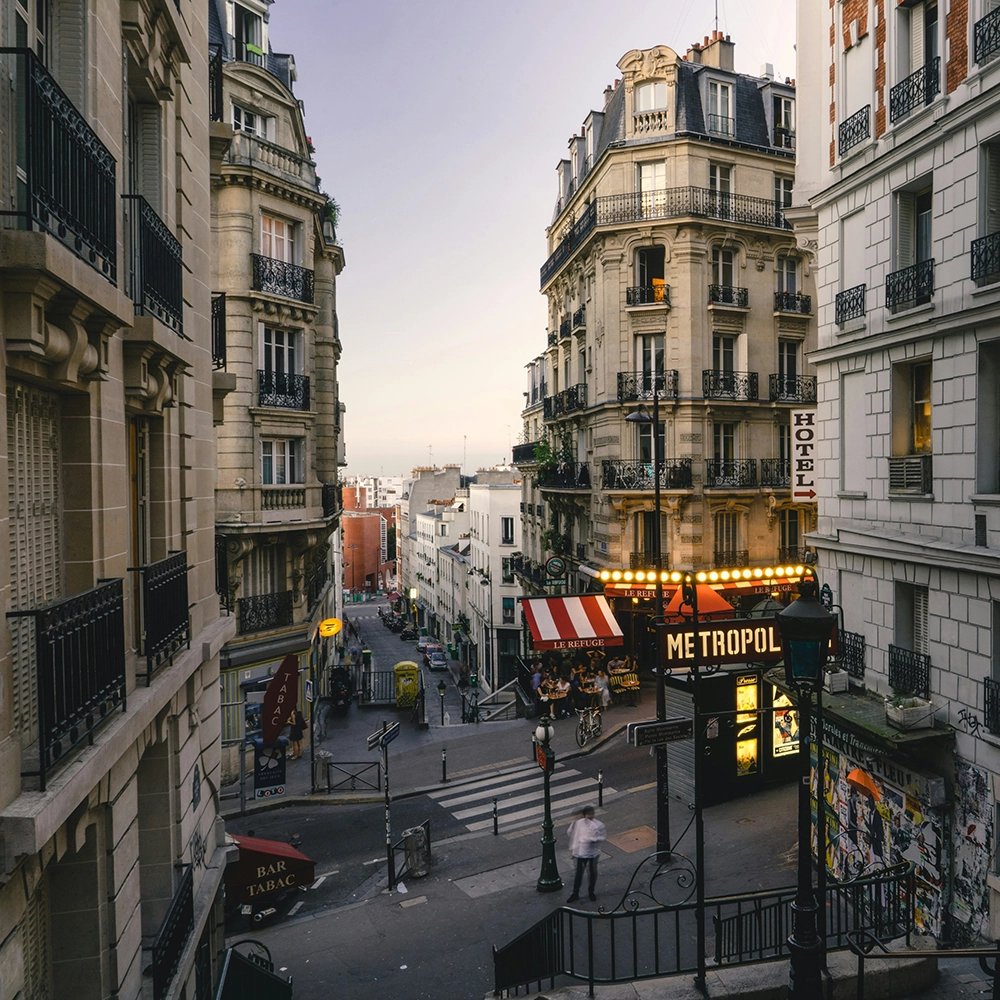Bonjour! Are you ready to journey to one of the most enchanting and romantic destinations in the world?
From charming cobblestone streets and quaint cafes to the aroma of freshly baked baguettes, discover all the beauty, elegance, and adventure you can find when traveling to France. Before you jet off, let’s take a look at some insider tips to prepare you for a trip.
Should You Buy Travel Insurance for France?
It's always a good idea to buy travel insurance for France and other international destinations. Your domestic health insurance often does not cover you in other countries. This means you could be left with costly medical bills if you get sick or hurt while traveling. Plus, you never know when an unexpected event could put the money you spent for your trip at risk.
Do I Need Travel Insurance for France?
While it is not mandatory to have travel insurance for U.S. citizens visiting France, it is highly recommended.
Although individual health insurance may cover some medical costs, you won’t be covered for issues like travel disruptions, baggage loss, and more. Tailored travel insurance for France ensures you have protection so you can have peace of mind and enjoy your trip stress-free.
France Travel Insurance Coverage Options
Every trip — and traveler — is different. That’s why Seven Corners offers a variety of plans to provide the coverage that best fits most travelers’ needs. Coverage options can differ depending on the plan you choose, the specific benefits and add-ons you select, and your state or country of residency. Below are some travel insurance benefits found in many of Seven Corners plans to help protect you during your trip to France.
Trip Cancellation
If you have to cancel your trip for a covered reason, Seven Corners could reimburse you for the prepaid, nonrefundable trip expenses you insured, saving you money.
What’s a covered reason? These can include triggers such as an illness that prevents you from traveling or inclement weather, like a hurricane, that makes it impossible to get to your destination.
For more flexibility, consider adding Cancel for Any Reason (CFAR) coverage. This optional benefit allows you to cancel your trip for any reason, not just those listed in your plan document.
Trip Interruption
An interruption often means you ended your trip and returned home early, but it can also include needing to start your trip late. With travel insurance, you could be reimbursed for unused prepaid, nonrefundable trip expenses, as well as the expense of additional transportation, if you need to interrupt your trip for a covered reason.
For the flexibility to interrupt your trip for any reason, not just those covered reasons listed in your plan document, consider adding optional Interruption for Any Reason (IFAR) coverage. Why might you use this benefit? Maybe you feel unsafe at your destination and decide to return home or move to your next destination early. Or you might simply change your mind about travel, so you end your trip early. IFAR allows you to do that and still recover some of your insured trip expenses.
Trip Delay
If you’re delayed while en route to France, coming home, or in the middle of your trip, this benefit can cover expenses like meals, lodging, and local transportation resulting from that delay. To be reimbursed, the delay must be caused by a covered reason, such as a flight delay lasting the required amount of time.
Lost or Delayed Baggage
Seven Corners will reimburse you to replace necessary personal belongings if your baggage is delayed by your airline or other common carrier while traveling to France. This includes items such as clothing and toiletries — personal items you need so that you can continue on your trip.
Seven Corners could pay to replace or repair insured items if your baggage is lost, delayed, damaged, or stolen during your trip.
For both lost and delayed baggage, it’s important to remember that some items such as laptops may not be covered. Your luggage also must be delayed for the length of time stated in the plan before you are eligible for reimbursement.
Travel Medical
Domestic health insurance typically does not cover you when you travel overseas. That’s why travel medical insurance is so important. This coverage can pay for medical treatment if you get sick or hurt during your trip, even when you’re abroad.
Different plans have different levels of medical coverage. Seven Corners Trip Protection plans provide coverage for Emergency Accident and Sickness Medical Expenses as well as Emergency Dental expenses. We also provide a variety of travel medical plans with robust medical coverage for international residents. Many of our plans provide pre-existing conditions coverage.
Emergency Medical Evacuation and Repatriation
If you get sick or hurt while traveling in France and adequate care is not available, Seven Corners will arrange an emergency medical evacuation to a medical facility that can provide treatment if it is deemed medically necessary. We will also arrange your return home so you can continue recovering.
Accidental Death and Dismemberment
This Seven Corners benefit provides coverage for loss of life or limb resulting from an injury caused by an accident during your trip to France.
What Is The Best Travel Insurance for France?
Seven Corners Trip Protection is our most popular plan for U.S. residents traveling to France. It provides protection for your trip expenses, belongings, and emergency medical expenses.
Seven Corners Travel Medical Insurance offers robust coverage for medical expenses if you get sick or hurt during your trip. These plans help travelers experience France confidently, knowing they’ll get the care they need without having to worry about how they’ll pay for it.
Finding the best travel insurance for your vacation to France is easy with our quick quote tool online. Answer a few simple questions, and we’ll recommend the best options for you and your trip. You can also contact our licensed agents for additional support so you know you've chosen the best travel insurance for a trip to France.
How Much Does Travel Insurance to France Cost?
The cost of travel insurance varies depending on the plan you choose as well as a number of other factors. Trip protection plans typically cost 4-10% of your total insurable trip cost. Take a few moments to learn how to calculate your trip cost so you know you have the right amount of coverage.
The cost of a travel medical plan is based on:
- The plan you choose
- Your age
- The length of your trip
- Customizable selections such as medical maximum, deductible, and other add-ons
You might be surprised how affordable travel insurance for France can be. Get a quick quote — no hassle, no commitment — to see for yourself.
Travel Requirements for France
When traveling to a new country, it’s important to be prepared before you head to the airport. Having the right passports, documents, and information requires proper preparation ahead of time. Start planning now by getting to know the documentation requirements needed for your trip.
Visa Requirements for France
In 2024, U.S. citizens with valid passports traveling for tourism or business can enter France without a visa for a period of 90 days within each six-month period. For French visa information please see the French Embassy’s website.
Passports need to be valid for at least three months beyond your intended date of departure from the Schengen Area. If your passport does not meet the Schengen requirements, you may be refused boarding by the airline at your point of origin or while transferring planes.
For this reason, it is recommended that your passport have at least six months’ validity left when traveling abroad.
You can learn more about these different types of visas, their eligibility requirements and restrictions, and how to obtain them by visiting our Schengen visa page.
NOTE: If you are planning your trip later than 2024, note that visa requirements will be changing for US citizens in 2025.
Documents and Forms
To travel to France, you’ll want to be sure your required documentation is packed and accessible at the airport. You'll need:
- Your valid passport
- A visa, if the trip requires one
For more information on required documents and forms, visit the U.S. Embassy & Consulates in France.
Public Health Requirements
There are currently no COVID-19-related restrictions in Italy (as of March 2024). However, it is important to revisit these travel guidelines every six months to ensure your information is current and accurate.
Travel Information & Safety Tips for France
Embarking on a journey to France opens the door to a world of beautiful landscapes, culinary delights, and rich cultural experiences.
Yet, navigating the intricacies of travel involves more than just packing your bags — it requires understanding both practical requirements and local customs.
From ensuring safety in bustling cities like Paris to embracing the leisurely French lifestyle, learn about what to expect and how to stay safe on your trip to France.
Is France safe to visit?
It is generally safe to travel to France, but you must stay alert when traveling. Petty crimes like pickpocketing and theft are common in tourist hotspots such as Paris and Marseille.
Use caution, especially in the metro. Additionally, beware of illegal taxis, which often overcharge unsuspecting tourists.
A great safety tool for travelers is the Smart Traveler Enrollment Program (STEP). When you enroll, you’ll get up-to-date information about safety precautions in your destination country. It will also help the U.S. Embassy and your friends and family contact you in case of an emergency.
You can also visit the U.S. Department of State website for your destination country to see the latest travel advisories.
What languages are spoken in France?
The majority of France’s population — about 96% — speaks French. However, it’s rare to go to a restaurant, cafe, or hotel in France’s major cities with no English speakers on staff. Around 57% of the population knows basic English.
Understanding French culture
France and the United States may seem worlds apart in terms of culture, especially for American travelers. Here are some key insights to help you understand and respect French customs during your visit:
Leisurely Lifestyle:
French life revolves around family, friends, enjoying good food, and relaxing in their free time, contrasting with the fast-paced American lifestyle.
Tipping Etiquette:
Unlike in the U.S., tipping isn't as common in France. While tipping isn't expected for services like taxis and meals, leaving a few euros at cafes or high-end restaurants is appreciated but not mandatory.
Wine Culture:
Wine is a major part of French culture, with France producing some of the finest wines globally. Contrary to America's preference for beer, wine holds a significant place in French adult social gatherings.
Mealtime Norms:
When eating in France, lunch is typically served from 12 to 2 p.m., but expect dinner from 7 p.m. or later. Be mindful of these norms when dining out or visiting French homes.
Social Interaction:
Personal boundaries are more pronounced in France compared to the U.S. Avoid delving into personal topics with strangers, as the French value privacy and discretion.
Politeness and Greetings:
Politeness is highly regarded in French society, with greetings like "bonjour" essential in interactions everywhere, including greeting people in waiting rooms, stores, etc.
If you don’t start a conversation or enter a store with “bonjour,” this is considered bad etiquette. Remember to use formal language ("vous") when addressing strangers.
What currency is used in France?
The euro (€) is the currency used in France. As of March 2024, the exchange rate between euros and United States dollars was 1 euro = 1.07 dollars.
What is the weather like in France?
When planning your trip, it is helpful to know the weather year-round and how it is different than home. This way, you can plan to enjoy the best time of year to visit.
Spring in France brings pleasant, temperate weather, with temperatures ranging from 50°F to 75°F. Expect heavy rainfall, especially in the north and along the west coast.
Summer in France sees warm to hot conditions, except in coastal areas, with temperatures ranging from 60°F to 80°F in Paris and 80°F to 90°F in Nice and the south coast. Heatwaves and summer storms are common.
Fall in France offers pleasant weather initially, with temperatures cooling later in October and November. Temperatures range from 40°F to 75°F, with occasional cold dips in temperature and rainy seasons.
Winter in France is chilly, with temperatures ranging from 32°F to 45°F, although warmer temperatures have been recorded in recent years. Snow is rare outside mountainous regions like the Alps and Pyrenees.
Food and Water Safety in France
Tap water is safe for consumption and widely accessible, including at public water fountains. In fact, drinking from Parisian fountains is encouraged unless there is a sign that says "eau non potable," which means “not for drinking.” So, don’t forget your reusable water bottle!
Food is also safe to eat in France, so feel free to shop at markets and local stores and eat with peace of mind. France has a thriving food culture, so be sure to participate and try some new cuisines during your stay.
Transportation
In France, you can get almost anywhere using a train, metro, or bus. Trains are a particularly great option for their scenic routes, speed, and comfort, making them an ideal choice for intercity and international travel.
Do I need a power adapter for my electronics?
When traveling to France, you will need a type E adapter. Type E is the plug that has two round pins and a hole for the socket's male earthing pin. France operates on a 230V supply voltage and 50Hz.
U.S. Embassy and Consulate Information for France
Before traveling to France, it’s important to know the location of the embassy or consulate nearest to where you’re staying. Here’s a full list of embassy and consulate locations.
U.S. Embassy Paris
2 Avenue Gabriel
75008 Paris, France
Phone: +(33)(1) 43-12-22-22
Emergency After-Hours Telephone: +(33)(1) 43-12-22-22, enter zero “0” after the automated greeting
NOTE: Only the consular sections in Paris and Marseille are authorized to issue passports. The other offices provide limited services to U.S. citizens.
U.S. Consulate General Marseille
Place Varian Fry
13286 Marseille Cedex 6
France
Phone: +(33)(1) 43-12-47-54
Emergency After-Hours Telephone: +(33)(1) 43-12-22-22
Citizeninfomarseille@state.gov
U.S. Consulate General Strasbourg
15, Avenue d'Alsace
67082 Strasbourg Cedex
France
Phone: +(33)(1) 43-12-48-80
Emergency After-Hours Telephone: +(33)(1) 43-12-22-22
USAStrasbourg@state.gov
NOTE: When calling from within France, drop the country code and add a zero. For example: +(33)(1) 43-12-22-22 becomes 01-43-12-22-22.
The emergency after-hours telephone number for all U.S. posts in France is: +(33)(1) 43-12-22-22.
Ask to speak to the duty officer if you need emergency assistance after business hours.
Contact Seven Corners about Travel Insurance for France
Travel insurance doesn’t have to be complicated. Just answer a few simple questions to get a quick, hassle-free quote online to find the best travel insurance for France. Licensed agents are also available to answer questions about Seven Corners plans and to help you customize your coverage.




